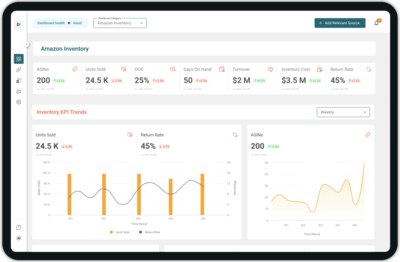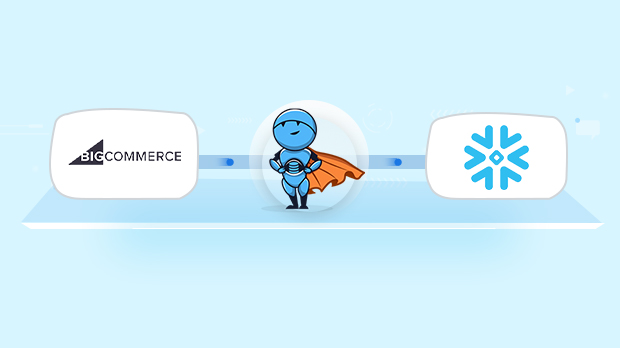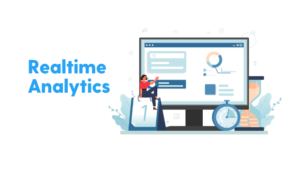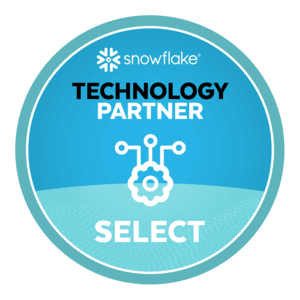If you’ve come here, you are probably looking for a way to transfer data from BigCommerce to Snowflake quickly. In this article, we will talk about why BigCommerce is essential for your eCommerce business and how you can get access to all of your BigCommerce data in a data warehouse without having to write any code.
The choice for eCommerce business when it comes to marketing and selling their merchandise is growing every day. Keeping in mind the complex cross-platform journey of a modern day customer. eCommerce vendors have to decide on what channels they want to sell on, which channels they want to spend their advertising dollars on, the channels include:
- Websites
- Mobile Applications
- Social Media Platforms
- Third-Party Marketplaces
- Retail stores
Complexity increases with the addition of every sales channel. For instance, if we consider marketing channels available to support online business, you will find a choice of:
- Social Media ads – Some platforms include Bing Ads, Instagram, LinkedIn, Twitter, and others
- Digital ads and remarketing – Criteo, Taboola, Outbrain, and others
- PPC – Bing Ads, Bing ads, and others
- Email – Mailchimp, Klaviyo, Hubspot, and others
- Podcasts
- Affiliate – Refersion, CJ Affiliates
- Influencer marketing
- Offline marketing
In a competitive digital landscape that we live in, it has become imperative that eCommerce businesses of all sizes that aspire to grow and stay profitable have to look into their data deeply and leverage this for growth.
With the increase in competition, eCommerce Companies should strive to be more data-driven for various reasons. Some of these reasons include
- understanding the balance between demand and supply,
- understanding customer lifetime value (LTV)
- Segmenting customer base for effective marketing
- finding opportunities to reduce wasteful spend
- optimizing digital assets to maximize revenue for the same marketing spend,
- improving ROIs on Ad campaigns and
- Offering an engaging and seamless experience for customers in every channel that the customer engages with the brand.
Due to the reasons highlighted above, any eCommerce business typically operates at least 10-15 different software/platforms to optimize their different verticals so as to maximize efficiency. eCommerce platforms like BigCommerce are one of the many tools or applications commonly used by companies for various reasons like:
- Minimizing the dependency on Software Developers to build Online –eCommerce Stores
- Decreasing Software Development Costs
- Decrease Time to Market
- Ease of Maintenance and Error-free operations
For, similar reasons other software/platforms are used to optimize other verticals like inventory management, customer support, marketing, payments etc. As a result, multiple data silos are created for every tool, sometimes even per tool per country/Region, which makes it more difficult to consolidate data and use the data for reporting, operations, analysis, and taking informed forward-looking decisions.
Businesses these days need to be efficient in terms of their data analysis. They are struggling to make sense of the data generated from various applications and tools used to manage different processes efficiently.
These silos analyze the entire business data comprehensively, challenging. Data Savvy eCommerce businesses try to reduce the effort of reporting and analysis by integrating data from all these channels into a cloud data warehouse like Snowflake. By taking this step, the process of reporting and analysis becomes easy, inexpensive, and consequently done more frequently.
In this post, we will be looking at methods to replicate data from BigCommerce to Snowflake.
Before we start exploring the process involved in data transfer, let us spend some time looking at these individual platforms.
BigCommerce Overview
BigCommerce is considered to be the world’s largest cloud eCommerce platform for fast-growing and emerging companies. It comes with a blend of organizational flexibility, an open architecture, app ecosystem and leading market efficiency. BigCommerce helps businesses to increase online sales with the reduced expense, time and complexity by 80 per cent than on-premise applications. BigCommerce supports B2B and B2C for over 60,000 products, over 2,000 midmarket companies, 30 Fortune 1000 companies and leading brands in the industry. It has some excellent store management features that help you stay focussed on your business. Many of these unique and useful characteristics include a robust product catalogue, flexible shipping & real-time quotes, coupon and discounting tools, and more. BigCommerce connects with Amazon and eBay and can sell on Facebook with social selling capabilities. The shipping capabilities of the solution are very efficient. BigCommerce is the only cloud platform with deep-integration ShipperHQ, a sophisticated shipping rate calculator and rules engine. This integration simplifies the delivery of quotes and tailored shipping rates in real-time. BigCommerce users love the following features:
- It provides a modern, high-end look to the storefront.
- It effectively manages orders.
- The User setup allows for each person to contribute while security is maintained through their User status and allowances.
- It has good search functions.
Snowflake Overview
Snowflake is a cloud-based data warehouse created by three data warehousing experts at Oracle Corporation in 2012. Snowflake Computing, the vendor behind the Snowflake Cloud Data Warehouse product, raised over $400 million over the past eight years and acquired thousands of customers. One might wonder if another data warehouse vendor is needed in an already crowded field of traditional data warehousing technologies like Oracle, Teradata, SQL Server, and cloud data warehouses like Amazon Redshift and Google BigQuery. Well, the answer is the disruption caused by cloud technologies and cloud opportunities for new technology companies. Public clouds enabled startups to shed past baggage, learn from the past, challenge the status quo, and take a fresh look at cloud opportunities to create a new data warehouse product. You can read this article to understand the core technology components that make up this modern, cloud-built data warehouse for consumers of cloud technologies.
You can register for a $400 free trial of Snowflake within minutes. This credit is sufficient to store a terabyte of data and run a small data warehouse environment for a few days.
For more information on BigCommerce Data Connector, you can visit the linked article.
Why Do Businesses Need to Replicate BigCommerce to Snowflake?
Let’s take a simple example to illustrate why data consolidation from BigCommerce to Snowflake can be helpful for an eCommerce business.
An e-Commerce company is selling its products in multiple countries and is using BigCommerce for their Online Stores. They have different marketing platforms, payment gateways, inventories, logistic channels and target audience in each country and are using various Softwares/Tools for this.
Now let us say that the company wants to calculate its overall business profits. We all know that:
Profits/Losses = Sales – Expenses
The sales data will come from BigCommerce, there will be different data silos for each country. In Order to calculate Expenses, the marketing costs coming from platforms like Google Adwords, Facebook Ads etc need to be factored in with other expenses like purchasing stock which might come from inventory management platforms like Olabi, which further need to be added to all other expenses occurred that is usually present in accounting software like Freshbooks. Thus, it becomes a nearly impossible task to pull all of these data from multiple platforms for each country separately, and then analyze all of this data together with the expense data and calculate profits. It involves a lot of working hours which costs money, and there is usually a time lag involved, which reduces the accuracy of the analysis and its effectiveness as the data is not analyzed in real-time. Thus it becomes necessary to consolidate all of the data in a data warehouse like Snowflake to simplify the process.
Again, If this company then wants to optimize its profits, they need to increase sales and decrease expenses. For this purpose, they might want to optimize their marketing campaigns and increase ROI. Hence they need to associate the traffic flowing from their marketing campaigns to the purchases taking place to understand which marketing activity is generating better ROIs and which needs improvement. Or an ad might be running off a product which might no longer be in stock, or might not be deliverable in the location which it is running, rendering these ads as redundant and thus causing a substantial loss for the company.
The company would be using Google Analytics to capture the flow of traffic from different channels into a website. But Google Analytics fails to capture the sales data accurately and the data from marketing tools like target audience, Ad impressions. To understand the sales funnel clearly, and give accurate attributions to the marketing activities, it becomes vital to check the data from the various data sources in use manually and then tally that data to the data coming from Google Analytics to gain meaningful insights. Hence, this becomes a difficult task when done manually on a scale.
Using Only Google analytics, it is not possible to :
- calculate Customer LTV
- Get accurate e-Commerce or sales data
- Give accurate attributions to marketing channels
- Analyze customer feedback
- View multiple website data silos together
- Analyze shipping, logistics, inventory and other data
- View and analyze data generated from third-party tools and software
The Problems for Decision-makers don’t just end here. They are faced with multiple other issues that need to be addressed like:
- There are separate data silos for inventory data, logistics data, which need to be separately downloaded and compared and updated regularly to
optimize any ad campaign, reduce redundant ads and calculate various expenses incurred across different verticals, find areas where expenses can be reduced. - Again if effective remarketing is to be done to improve Ad ROIs, then people who have not completed payments, or have encountered a failed transaction need to be targeted in addition to people who have added products to their cart, wishlists or favourites. People who have responded to other marketing campaigns like email, SMS, social media marketing also need to be targeted. So again separate data silos from various selling platforms, payment gateways, marketing tools need to be downloaded, analyzed and compared.
- Audience profiling data from BigCommerce, CRMs, customer support systems need to be analyzed to optimize audience targeting.
For these reasons, top companies consolidate all of their data from BigCommerce and other apps and tools into a data warehouse like Snowflake to analyze the data and generate reports at a rapid pace.
Replicate Data from BigCommerce to Snowflake
There are two board ways to pull data from any source to any destination. The decision is always a build vs buy decision. Let us look at both these options to see which option provides the business with a scalable, reliable, and cost-effective solution for reporting and analysis of BigCommerce data. You can also retrieve the data from Snowflake any time you want.
Use a Cloud Data Pipeline
Building support for APIs is not only tedious but it is also extremely time-consuming, difficult, and expensive. Engaging analysts or developers in writing support for these APIs takes away their time from more revenue-generating endeavors. Leveraging a cloud data pipeline like Daton significantly simplifies and accelerates the time it takes to build automated reporting. Daton supports automated extraction and loading of BigCommerce data into cloud data warehouses like Google BigQuery, Snowflake, Amazon Redshift, and Oracle Autonomous DB.
Configuring data replication on Daton on only takes a minute and a few clicks. Analysts do not have to write any code or manage any infrastructure but yet can still get access to their BigCommerce data in a few hours. Any new data is generated is automatically replicated to the data warehouse without any manual intervention.
Daton supports replication from BigCommerce to a cloud data warehouse of your choice, including Snowflake. Daton’s simple and easy to use interface allows analysts and developers to use UI elements to configure data replication from BigCommerce data into Snowflake. Daton takes care of
- authentication
- rate limits,
- Sampling,
- historical data load,
- incremental data load,
- table creation,
- table deletion,
- table reloads,
- refreshing access tokens,
- Notifications
and many more important functions that are required to enable analysts to focus on analysis rather than worry about the data that is delivered for analysis.
Daton – The Data Replication Superhero
Daton is a fully-managed, cloud data pipeline that seamlessly extracts relevant data from many data sources for consolidation into a data warehouse of your choice for more effective analysis. The best part analysts and developers can put Daton into action without the need to write any code.
Here are more reasons to explore Daton:
- Support for 100+ data sources – In addition to BigCommerce, Daton can extract data from a varied range of sources such as Sales and Marketing applications, Databases, Analytics platforms, Payment platforms, and much more. Daton will ensure that you have a way to bring any data to Snowflake and generate relevant insights.
- Robust scheduling options allow users to schedule jobs based on their requirements using simple configuration steps.
- Support for all major cloud data warehouses including Google BigQuery, Snowflake, Amazon Redshift, Oracle Autonomous Data Warehouse, PostgreSQL, and more.
- Low Effort & Zero Maintenance – Daton automatically takes care of all the data replication processes and infrastructure once you sign up for a Daton account and configure the data sources. There is no infrastructure to manage or no code to write.
- Flexible loading options allows you to optimize data loading behaviour to maximize storage utilization and also easy querying.
- Enterprise-grade encryption gives your peace of mind
- Data consistency guarantee and an incredibly friendly customer support team ensure you can leave the data engineering to Daton and focus instead of analysis and insights!
- Enterprise-grade data pipeline at an unbeatable price to help every business become data-driven. Get started with a single integration today for just $10 and scale up as your demands increase.
Interested in learning more about data warehouses, their architecture, and how they are priced? Check out our other articles.
We Saras, can help with our eCommerce-focused Data pipeline (Daton) and custom ML and AI solutions to ensure you always have the correct data at the right time. Request a demo and envision how reporting is supercharged with a 360° view.














